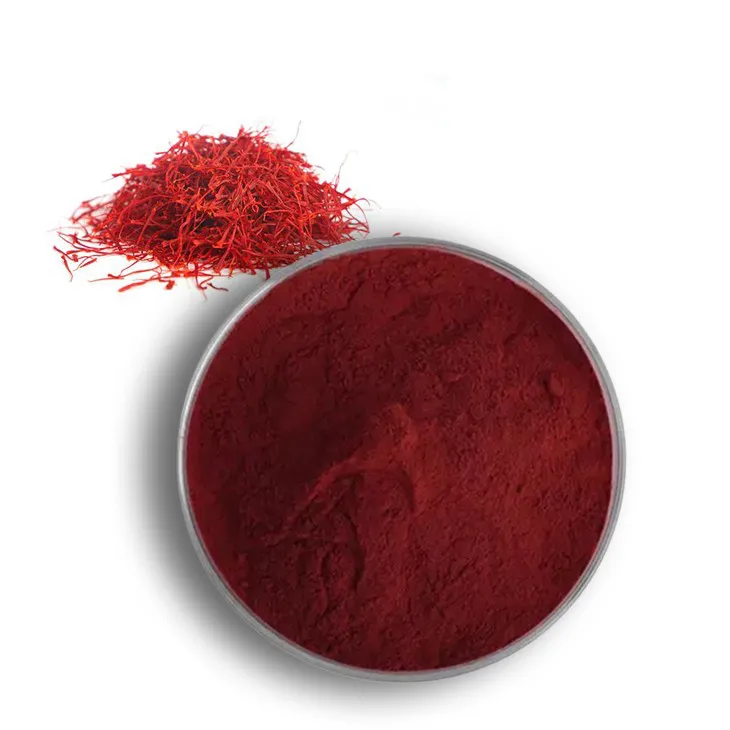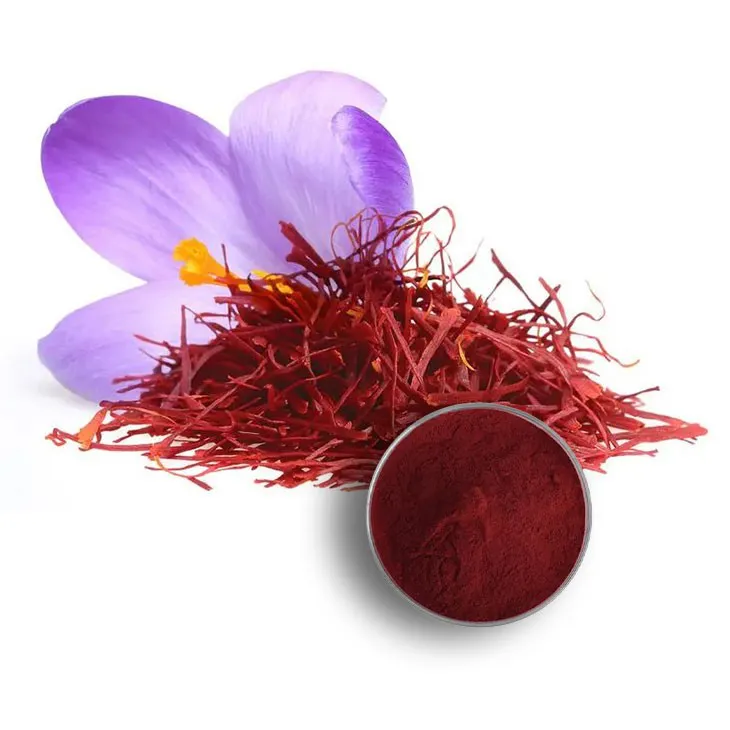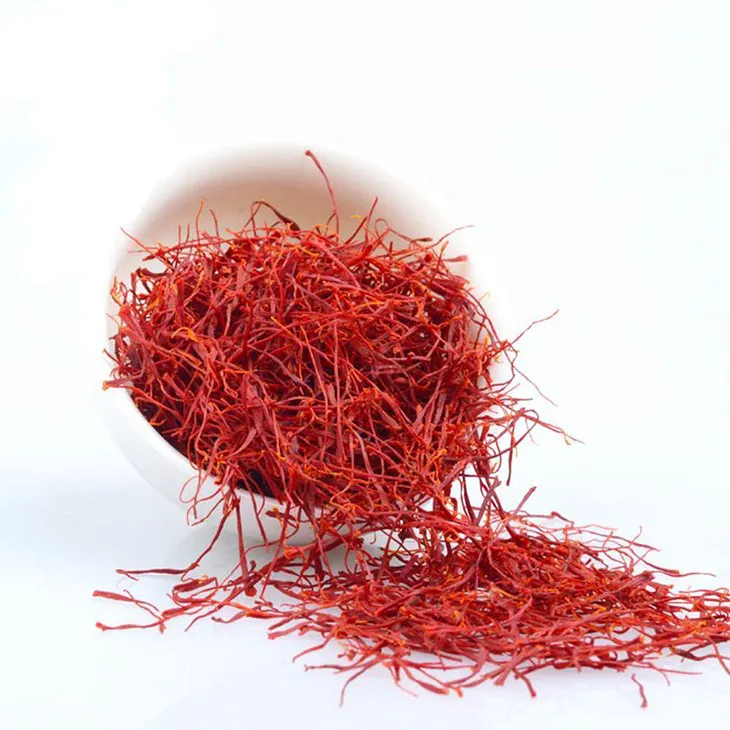- 0086-571-85302990
- sales@greenskybio.com
The Best Sources of Natural Saffron Extract Powder.
2024-11-30

Introduction
Natural Saffron Extract Powder has been gaining significant attention in recent years due to its various potential benefits. It is used in cooking for its unique flavor and color, as well as in the field of health and wellness for its possible medicinal properties. Discovering the prime sources of this precious powder is crucial for ensuring high - quality products. In this article, we will explore some of the best sources of natural Saffron Extract Powder around the world.

Afghanistan: High - Altitude Treasure
1. Geographical Advantage
- The high - altitude terrains in certain areas of Afghanistan are emerging as important sources of natural saffron. These regions experience cold nights and warm days, which create an ideal environment for saffron growth. The significant temperature differences between day and night help the saffron plants to develop potent active ingredients.
- Local farmers in Afghanistan have been gradually improving their cultivation techniques. They are learning to optimize the use of the natural climate conditions to produce saffron of high quality. For example, they are more careful about the timing of watering, as excessive or insufficient water can affect the growth and quality of saffron.
- Moreover, the choice of soil in these high - altitude areas is also crucial. The soil with good drainage and rich in certain minerals provides a solid foundation for saffron plants to thrive.
- The saffron produced in Afghanistan has the potential to be a top - notch source for Saffron Extract Powder. With proper extraction methods, it can offer a rich concentration of the active compounds that are highly sought after in the market.
- However, challenges such as infrastructure limitations and security issues in some parts of the country can sometimes affect the consistent production and export of saffron. But efforts are being made to overcome these obstacles to fully realize the potential of Afghan saffron in the global market.

Greece: A Land of Tradition
1. Rich Agricultural Heritage
- Greece, with its long - standing agricultural traditions, is a notable source of natural saffron. The knowledge and experience passed down through generations have contributed to the high - quality saffron production in the country.
- Traditional farming methods are still maintained in some areas, which often involve more manual labor and attention to detail. For instance, farmers carefully select the best saffron bulbs for planting and closely monitor the growth process.
- Greek saffron is often praised for its purity. This is partly due to the strict quality control measures implemented by local producers. They ensure that the saffron is free from contaminants and that only the highest - quality stigmas are used for extraction.
- The reputation of Greek saffron in the international market is quite high. Consumers recognize it as a reliable source of high - quality saffron extract powder, which is used not only in cooking but also in various health - related products.
- Many Greek saffron producers are also focusing on sustainable cultivation practices. They are aware of the importance of protecting the environment while maintaining the productivity of saffron fields. This includes measures such as soil conservation, water management, and the use of natural fertilizers.
- By promoting sustainable cultivation, Greek saffron producers are not only ensuring the long - term availability of their product but also meeting the increasing demand for environmentally - friendly products in the global market.

Morocco: Arid - Climate Advantage
1. Climate and Soil Conditions
- In Morocco, the arid climate and specific soil types are conducive to saffron growth. The dry and warm weather, along with the well - drained soil, provides an environment where saffron plants can develop their characteristic features.
- The soil in Morocco contains certain elements that are beneficial for saffron. These elements contribute to the unique flavor and health - promoting properties of Moroccan saffron.
- Moroccan farmers have developed their own cultivation and harvesting techniques over time. They are well - adapted to the local climate conditions. For example, they know the best time to plant saffron bulbs based on the rainfall patterns and temperature changes in the region.
- During the harvesting season, great care is taken to pick the saffron stigmas at the right time. This is crucial as the quality of saffron extract powder depends largely on the freshness and proper handling of the harvested stigmas.
- Moroccan saffron has a significant presence in the international market. It is known for its unique flavors and is used in a variety of Moroccan and international cuisines. When processed into extract powder, it can offer a distinct taste and aroma.
- The Moroccan government and local producers are also making efforts to promote Moroccan saffron further. This includes participation in international trade fairs, quality certifications, and marketing campaigns to increase the visibility and competitiveness of Moroccan saffron in the global market.
Quality Control in Saffron Extract Powder Production
1. Importance of Quality Control
- Regardless of the source, strict quality control during the cultivation and extraction processes is vital to ensure the best natural saffron extract powder. Quality control starts from the very beginning, i.e., the selection of saffron bulbs or seeds for planting.
- During the growth period, factors such as the use of pesticides (if any), irrigation, and protection from pests and diseases need to be carefully monitored. Any deviation from the proper practices can affect the quality of the saffron produced.
- The extraction process of saffron extract powder is also a critical aspect of quality control. The use of appropriate solvents, extraction temperatures, and extraction times can significantly impact the final product.
- Producers need to ensure that the extraction process is carried out in a clean and hygienic environment to prevent contamination. Moreover, modern extraction techniques are often preferred as they can be more efficient and result in a higher - quality extract.
- Quality testing is an essential part of the production process. Tests such as chemical analysis to determine the concentration of active ingredients, microbiological tests to check for the presence of harmful microorganisms, and sensory evaluation to assess the flavor and color are commonly carried out.
- Certification from recognized international or national bodies also adds value to the saffron extract powder. Certifications such as ISO standards or specific saffron - related certifications can assure consumers of the quality and authenticity of the product.
Conclusion
Afghanistan, Greece, and Morocco are among the best sources of natural saffron extract powder. Each region has its own unique advantages in terms of climate, soil, and cultivation traditions. However, to fully realize the potential of these sources, strict quality control measures must be implemented throughout the cultivation and extraction processes. As the demand for natural saffron extract powder continues to grow, both producers and consumers need to be aware of the importance of high - quality sources and proper production methods to ensure that they can enjoy the full benefits of this precious natural product.
FAQ:
What are the main regions known for natural saffron extract powder sources?
Afghanistan, Greece, and Morocco are among the main regions known for natural saffron extract powder sources. The high - altitude terrains in Afghanistan, with its distinct climate of cold nights and warm days, allow saffron with strong active ingredients to grow. Greece, having long - standing agricultural traditions, is notable for its pure saffron. In Morocco, the arid climate and specific soil types are conducive to saffron growth.
Why is the climate in Afghanistan suitable for saffron growth related to extract powder?
The cold nights and warm days in the high - altitude terrains of Afghanistan are ideal for saffron growth. This climate helps saffron develop potent active ingredients, which are important when the saffron is processed into extract powder. These active ingredients contribute to the unique properties and potential benefits of the saffron extract powder.
What makes Greek saffron special for extract powder production?
Greek saffron is special for extract powder production due to its purity. Greece has long - standing agricultural traditions which likely contribute to the high - quality and pure saffron produced there. When this pure saffron is processed into extract powder, it can be of high quality with desirable characteristics.
How does the climate in Morocco affect saffron for extract powder?
The arid climate in Morocco, along with its specific soil types, is conducive to saffron growth. This environment allows saffron to develop in a way that when it is processed into extract powder, it can offer unique flavors and health - promoting properties. The saffron is able to absorb certain elements from the soil and adapt to the arid climate, which may enhance its qualities for extract powder.
Why is strict quality control important in the production of natural saffron extract powder?
Strict quality control is important in the production of natural saffron extract powder because it ensures the best product. During cultivation, it helps to ensure that the saffron is grown in optimal conditions to develop the right active ingredients. In the extraction process, quality control ensures that the extract powder retains its beneficial properties, flavors, and purity. Without it, the final product may not have the expected quality or effectiveness.
Related literature
- The Saffron - A Comprehensive Review on Cultivation, Properties and Applications"
- "Saffron Extract: Chemical Composition and Therapeutic Potential"
- "Quality Assessment of Saffron from Different Geographical Origins"
- ▶ Hesperidin
- ▶ citrus bioflavonoids
- ▶ plant extract
- ▶ lycopene
- ▶ Diosmin
- ▶ Grape seed extract
- ▶ Sea buckthorn Juice Powder
- ▶ Beetroot powder
- ▶ Hops Extract
- ▶ Artichoke Extract
- ▶ Reishi mushroom extract
- ▶ Astaxanthin
- ▶ Green Tea Extract
- ▶ Curcumin Extract
- ▶ Horse Chestnut Extract
- ▶ Other Problems
- ▶ Boswellia Serrata Extract
- ▶ Resveratrol Extract
- ▶ Marigold Extract
- ▶ Grape Leaf Extract
- ▶ blog3
- ▶ blog4
-
100% Organic Baicalin.
2024-11-30
-
Chinese Cocoa Extract Powder Manufacturers
2024-11-30
-
Chinese peppermint oil powder manufacturers.
2024-11-30
-
L - Tyrosine Manufacturers from China.
2024-11-30
-
The Optimal Method for Extracting Diosmin.
2024-11-30
-
Tinospora cordifolia extract
2024-11-30
-
Ginger Extract
2024-11-30
-
White mustard seed extract
2024-11-30
-
Baicalin
2024-11-30
-
Calendula Extract
2024-11-30
-
Acerola Extract
2024-11-30
-
Cat Claw Extract
2024-11-30
-
Cranberry Extract
2024-11-30
-
Buckthorn bark extract
2024-11-30
-
Grape Leaf Extract
2024-11-30





















